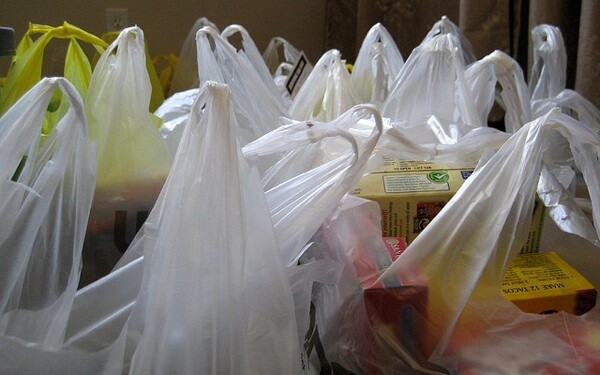Los Angeles is One Step Closer Towards Banning Single-Use Bags

In what is the strictest bag ban to be explored to date, the Los Angeles Board of Public Works met Wednesday morning and unanimously voted to support a ban of plastic and paper bags in the city of Los Angeles.
The board voted 4-0 in favor of the ban, which still must go through an environmental review by the Bureau of Sanitation and be drafted by the City Attorney's office before consideration and approval by the city council and Mayor Antonio Villaraigosa.
In a process that could take months, Board of Public Works President, Andrea Alarcón, asked the Bureau and City Attorney's office to act meticulously yet swiftly in order to put the ban in effect immediately.
"When you look at the costs that are being incurred by the City in order to evade this type of litter and the environmental impacts that this litter is causing to our communities and bodies of water," Alarcón said. "there really is no choice left for the City."
Although the vote was unanimous, opposition showed up by the dozens to oppose a ban, they claimed, that would kill jobs and ruin lives.
"A ban is not the right answer," said Catherine Browne, General Manager at Crown Poly, a local plastic bag manufacturer. "Consumers have the right to choose what they want. Government has the obligation to educate consumers as to what a better choice is, but the choice should be made by consumers."
Crown Poly, which is located in Vernon, employs 300 people and 65 percent of what is manufactured at Crown are grocery bags, according to Browne. She said that her firm would not be able to stay in business under the proposed ban.
Dozens of workers from Crown and other plastic manufacturing companies testified that if the ban is enacted, not only would they lose their jobs, but also competitive wages, health insurance and language classes.
While sympathetic to their stories, the board and proponents for the ban questioned the direct link to a bag ban and job loss in the manufacturing sector because all the firms make multiple products besides grocery bags and distribute outside of California.
"The most passionate testimony came from a sales manager whose company doesn't even make grocery bags," pointed out Vice President Jerilyn Mendoza.
Leslie Tammanen, Ocean Director of the non-profit Seventh Generation Advisors, while saddened by the testimony of the workers, insisted that the environmental consequences are too high not to change.
"Jobs are the American dream, but there is nothing patriotic about pollution." Tammanen said. "Even though China manufactures most of the plastic bags and imports them here, their own country has banned their use."
Various countries have banned or fined plastic bags, but California is leading the way in the U.S. as almost 19 cities have either banned or are trying to ban plastic bags. In Southern California, Long Beach, Santa Monica and Calabasas are just a few of the cities that have adopted similar ordinances. Unincorporated areas of L.A. county also have a bag ban in place.
An estimated 1.2 to 2.3 billion single-use plastic carryout bags and 400 million single-use paper bags are used annually in Los Angeles, according to a Bureau of Sanitation Board report. Only 5 percent of plastic and 21 percent of paper bags are recycled.
All the proponents for the ban insisted that recycling is not working and trash from the bags are negatively impacting our environment.
Bill Hickman, Program Coordinator for the Surf Rider Foundation said that 80 percent of ocean litter is land based, while Kirsten James, Water Quality Director at Heal the Bay, said that a study by the Algalita Marine Research Foundation found that 35 percent of the fish they sampled had ingested plastic fragments.
"The time is now," James said. "The city of L.A. really has a chance to be a true leader, the biggest city to take action on this in the nation. It is one of the most progressive policies we have seen before us."
While plastic bag bans having been popping up all over the country, Los Angeles will be the first municipality to adopt a single-use bag ban that includes plastic, paper, compostable and biodegradable bags.
Although paper bags are recycled at a higher percentage than plastic bags, paper bags emit more greenhouse gases resulting in higher atmospheric acidification, water consumption and ozone production over its lifetime, according to the Santa Monica Single-use Carryout Bag Ordinance Environmental Impact Report. A paper bag's ability to biodegrade when littered into oceans could potentially impact aquatic life.
The Bureau report states that biodegradable bags have larger environmental impacts at the manufacturer level and may have the same results on the environment as regular plastic bags since they degrade only under composting conditions.
As it stands, the proposal would apply to at least 7,500 retailers. Failure to obey the ban would cost them businesses $250 to $500 a day.
Although this is just the beginning stages of the ban, the aggressive program is supported by council members, various communities and environmentalists. If everything goes smoothly, the ban is expected to take effect next year.
"The price is too high on the environmental side for us to sit back and do nothing," Commissioner Steve Nutter said. "We have to have the vision to make the change now."

Aja Dang is a graduate student at the University of Southern California's Annenberg School for Communication & Journalism, which has partnered with KCET-TV to produce this blog about policy in Los Angeles.
The photo used on this post is by Flickr user mtsofan. It was used under a Creative Commons License